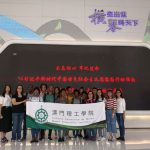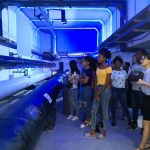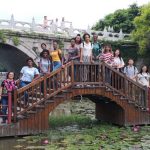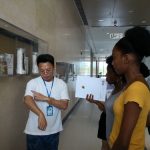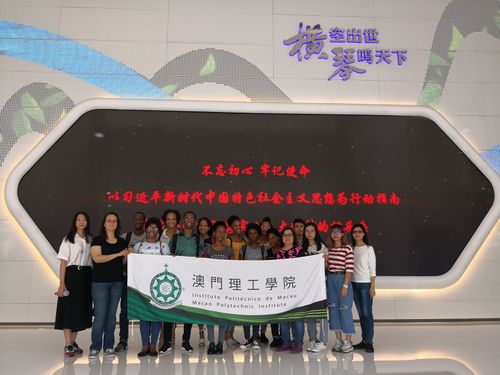 Group photo at the Construction and Development Planning Exhibition Hall in Hengqin New Area
Group photo at the Construction and Development Planning Exhibition Hall in Hengqin New Area
To enhance the students’ understanding of the latest developments in Guangdong-Hong Kong-Macao Greater Bay Area, the Student Affairs Office of the Macao Polytechnic Institute (MPI) recently organised a number of international students and Macao students to visit Hengqin in Zhuhai, where they were welcomed by the Macao Affairs Bureau of the Zhuhai Hengqin New Area Administrative Committee. The students were arranged to visit the Construction and Development Planning Exhibition Hall in Hengqin New Area, the Hengqin underground comprehensive pipeline project, and the Traditional Chinese Medicine Science and Technology Industrial Park of Co-operation between Guangdong and Macao and other facilities. All students have learned profoundly and look forward to the future development of Guangdong-Hong Kong-Macao Greater Bay Area.
The MPI students went to Hengqin via Gongbei Port. First, they visited the Construction and Development Planning Exhibition Hall in Hengqin New Area to understand the overall plan of Hengqin. Under the guidance of professional guide, the MPI students watched a video showing that Hengqin was developed from a small fishing village dominated by breeding oysters a few years ago, into today’s prosperous Hengqin Free Trade Zone. The exhibition hall also displayed the blueprint for the development of Hengqin in the future with advanced multimedia interactive technology. Students have a deeper understanding of Hengqin’s control planning, as well as enjoying the interactive multimedia technology of the exhibition hall. Afterwards, the students visited the Hengqin underground comprehensive pipeline project. The pipeline centralised management of Hengqin’s power, communication, water supply, sewage treatment, cooling and garbage vacuum systems, which significantly saved urban land and improved the problem of pipeline maintenance and repeated excavation of roads. The complete conception and system management have opened the students’ eyes. The last stop, the Traditional Chinese Medicine Science and Technology Industrial Park of Co-operation between Guangdong and Macao is a demonstration zone for exploring the new model of cooperation between Guangdong, Hong Kong and Macao under the “one country, two systems” policy. It is a new space for the moderate and diversified development of the Macao economy. Participating international students from MPI were introduced for the first time to the basic theory of traditional Chinese medicine by experts from the industrial park. They were amazed by almost everything such as burnt hair, horse bezoar, and placenta for the traditional Chinese medicine uses. Ms. Ng, who is studying nursing, said that she felt that Hengqin was determined to push traditional Chinese medicine to the world, and thus she had more confidence and expectation for the development of traditional Chinese medicine.
In order to let international students know about Chinese classical architecture, the event arranged a tour of the New Yuan Ming Palace in Zhuhai, which is a constructed with some famous construction and scenery in Yuanmingyuan. The palace combines the Qing Dynasty royal architecture, Jiangnan garden style and Western architecture. It allowed the students to experience the beauty of Chinese classical architecture. The students expressed their appreciation of the organisation and arrangement by MPI. Their impression of the changes of Hengqin was very profound by comparing the old appearance of Hengqin fishing village and the modern high-tech city along the way. The Student Affairs Office of MPI hoped that through the visits to Hengqin and Zhuhai, the students could experience the rapid development of the cities of mainland China, and look forward to the future of actively participating in the multi-planning and construction of the Guangdong-Hong Kong-Macao Greater Bay Area.
View gallery

